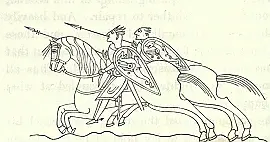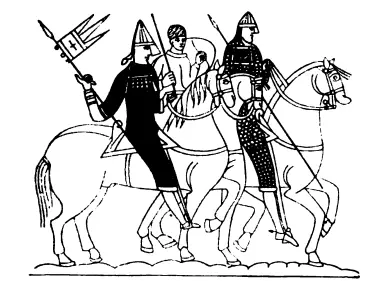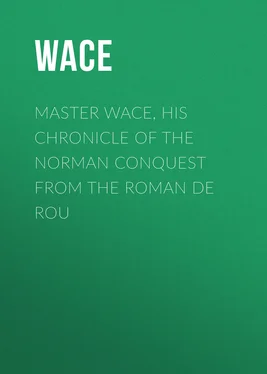Wace - Master Wace, His Chronicle of the Norman Conquest From the Roman De Rou
Здесь есть возможность читать онлайн «Wace - Master Wace, His Chronicle of the Norman Conquest From the Roman De Rou» — ознакомительный отрывок электронной книги совершенно бесплатно, а после прочтения отрывка купить полную версию. В некоторых случаях можно слушать аудио, скачать через торрент в формате fb2 и присутствует краткое содержание. Жанр: foreign_prose, История, foreign_edu, foreign_antique, на английском языке. Описание произведения, (предисловие) а так же отзывы посетителей доступны на портале библиотеки ЛибКат.
- Название:Master Wace, His Chronicle of the Norman Conquest From the Roman De Rou
- Автор:
- Жанр:
- Год:неизвестен
- ISBN:нет данных
- Рейтинг книги:4 / 5. Голосов: 1
-
Избранное:Добавить в избранное
- Отзывы:
-
Ваша оценка:
- 80
- 1
- 2
- 3
- 4
- 5
Master Wace, His Chronicle of the Norman Conquest From the Roman De Rou: краткое содержание, описание и аннотация
Предлагаем к чтению аннотацию, описание, краткое содержание или предисловие (зависит от того, что написал сам автор книги «Master Wace, His Chronicle of the Norman Conquest From the Roman De Rou»). Если вы не нашли необходимую информацию о книге — напишите в комментариях, мы постараемся отыскать её.
Master Wace, His Chronicle of the Norman Conquest From the Roman De Rou — читать онлайн ознакомительный отрывок
Ниже представлен текст книги, разбитый по страницам. Система сохранения места последней прочитанной страницы, позволяет с удобством читать онлайн бесплатно книгу «Master Wace, His Chronicle of the Norman Conquest From the Roman De Rou», без необходимости каждый раз заново искать на чём Вы остановились. Поставьте закладку, и сможете в любой момент перейти на страницу, на которой закончили чтение.
Интервал:
Закладка:
He was at that time sojourning at Valognes, for his pleasure as well as on business; and had been engaged for several days hunting and shooting in the woods. One evening late his train had left his court, and all had gone to rest at the hostels where they lodged, except those who were of his household; and he himself was laid down. Whether he slept or not I do not know, but in the season of the first sleep, a fool named Golet 17 17 William of Jumieges calls him Gallet; and says he was of Bayeux.
came, with a staff slung at his neck, crying out at the chamber door, and beating the wall with the staff; "Ovrez!" said he, "Ovrez! ovrez! ye are dead men: levez! levez! Where art thou laid, William? Wherefore dost thou sleep? If thou art found here thou wilt die; thy enemies are arming around; if they find thee here, thou wilt never quit the Cotentin, nor live till the morning!"
Then William was greatly alarmed; he rose up and stood as a man sorely dismayed. He asked no further news, for it seemed unlikely to bring him any good. He was in his breeches and shirt, and putting a cloak around his neck, he seized his horse quickly, and was soon on the road. I know not whether he even stopped to seek for his spurs, or whether he took any companion of his flight, but he hasted on till he came to the fords nearest at hand, which were those of Vire, and crossed them by night in great fear and anger. From thence he bent his way to the church of St. Clement 18 18 The church of St. Clement, a commune at the embouchure of the Vire, near Isigny. The fords of Vire are also mentioned by Wace again in narrating William's rapid journey from Valognes to Arques. He seems to have crossed by the route (abandoned under Louis XIV.) called the Grand-vey (ford), by Montebourg, Emondeville, Surqueville, the Chaussée d'Audouville, and St. Marie du Mont, where the water was entered near Brucheville for Saint Clement, and thence to Rye. Froissart mentions it as the road by which the Earl of Arundel returned to Cherbourg in 1388, after ravaging the Bessin. The great Talbot narrowly escaped by the same road, from an unfortunate expedition. Mém. Ant. Norm , v. 295.
, and prayed God heartily, if it were his will, to be his safe conduct, and let him pass in safety. He dared not turn towards Bayeux, for he knew not whom to trust, so he took the way which passes between Bayeux and the sea. And as he rode through Rie before the sun rose, Hubert de Rie 19 19 Rye, three leagues north of Bayeux. The church of Rye is very ancient and curious. Hubert was the father of five sons—Ralf, Hubert, Adam, Eudo (called Eudo the Dapifer in Domesday,) and Robert, a Bishop.
stood at his gate, between the church and his castle 20 20 'Entre li mostier es a mote, ' the mound or elevation on which the castle or mansion of Hubert stood; a sense very different from that in which we use the word moat , namely, the surrounding fosse.
, and saw William pass in disorder, and that his horse was all in a sweat. "How is that you travel so, fair sire?" cried he. "Hubert," said William, "dare I tell you?" Then Hubert said, "Of a truth, most surely! say on boldly!" "I will have no secrets with you; my enemies follow seeking me, and menace my life. I know that they have sworn my death." Then Hubert led him into his hostel, and gave him his good horse, and called forth his three sons. "Fair sons," said he, "muntez! muntez! Behold your lord, conduct him till ye have lodged him in Falaise. This way ye shall pass, and that; it will be ill for you to touch upon any town." So Hubert taught them well the ways and turnings; and his sons understood all rightly, and followed his instructions exactly. They crossed all the country, passed Folpendant 21 21 What spot or stream is here indicated is now, we believe, unknown. It is said there is a Foupendant in the environs of Moutiers, but that there is no stream there.
at the ford, and lodged William in Falaise. If he were in bad plight, what matters so that he got safe?
Hubert remained standing on his bridge; he looked out over valley, and over hill, and listened anxiously for news, when they who were pursuing William came spurring by. They called him on one side, and conjured him with fair words to tell if he had seen the bastard, and whither and by what road he was gone. And he said to them, "He passed this way, and is not far off; you will have him soon; but wait, I will lead you myself, for I should like to give him the first blow. By my faith, I pledge you my word, that if I find him, I will strike him the first if I can." But Hubert only led them out of their way till he had no fear for William, who was gone by another route. So when he had talked to them enough of this thing and that, he returned back to his hostel.
The Cotentin and the Bessin were in great dismay that day, for the alarming news soon went through the country of William's being betrayed, and how he was to have been murdered by night. Some said he was killed; others that he was taken; many said that he had fled:—"May God protect him," said all. Between Bayeux and the fords 22 22 Of Vire.
the roads were to be seen covered with those who came from Valognes, holding themselves as dead or disgraced men, for having lost their lord, whom they had safe overnight. They know not where to seek their lord, who had been among them but last evening: they go enquiring tidings of him around, without knowing whither to repair. And heavily do they curse Grimoult del Plesseiz, and those who trust in him; for they vehemently suspect that he has done foul treason by his lord. Thus all Normandy was frightened and troubled at what had happened.
The viscounts hated the duke; they seized his lands, and omitted to lay hold of nothing which they could reach. They plundered him so completely, that he was unable to do any thing, either for right or wrong. He could not enter the Bessin, neither demand rent or service; so he went to France, to King Henry 23 23 It was, according to Ordericus Vitalis, at Poissy (Pexeium), that William met the King of France, to seek his aid.
, whom his father Robert served, and complained against Neel, that he had injured him, and had seized his rents. He complained also of Hamon-as-dens, and of Guion le Burgenion; of Grimoult, who would have betrayed him, and whom he might well hate more than any other; and of Renouf de Briquesart, who took and spent his rents; and of the other barons of the country who had risen up against him.

CHAPTER II.
HOW THE KING OF FRANCE CAME; AND OF THE BATTLE THAT WAS FOUGHT AT VAL DES DUNES

The King of France, upon hearing the words that William spoke, and the complaints he made, sent forth and summoned his army, and came quickly into Normandy. And William called together the Cauchois, and the men of Roem, and of Roumoiz 24 24 Rouen, and the district attached.
, and the people of Auge, and of the Lievin 25 25 The pays de Lisieux. Oismeiz is the pays d'Exmes.
, and those of Evreux, and of the Evrecin. In Oismeiz also they quickly assembled when the summons reached them.
Between Argences and Mezodon 26 26 Argences and Mezidon, both situate in the pays d'Auge.
, upon the river Lison 27 27 Laison.
, the men of France pitched their tents; and those of the Normans, who held fast to William, and came in his cause, made their camp near the river Meance, which runs by Argences 28 28 All the topographical details concerning this battle of Val-des-dunes are stated to be perfectly correct, and to show Wace's acquaintance with the neighbourhood.
.
Интервал:
Закладка:
Похожие книги на «Master Wace, His Chronicle of the Norman Conquest From the Roman De Rou»
Представляем Вашему вниманию похожие книги на «Master Wace, His Chronicle of the Norman Conquest From the Roman De Rou» списком для выбора. Мы отобрали схожую по названию и смыслу литературу в надежде предоставить читателям больше вариантов отыскать новые, интересные, ещё непрочитанные произведения.
Обсуждение, отзывы о книге «Master Wace, His Chronicle of the Norman Conquest From the Roman De Rou» и просто собственные мнения читателей. Оставьте ваши комментарии, напишите, что Вы думаете о произведении, его смысле или главных героях. Укажите что конкретно понравилось, а что нет, и почему Вы так считаете.












